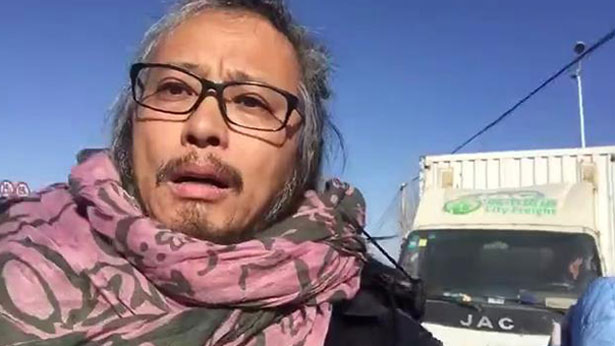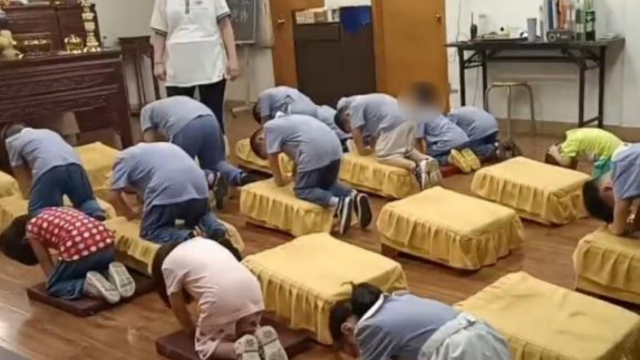Authorities in the Chinese capital have issued an eviction order to a Beijing artist released on bail after documenting a street protest by migrant workers against mass forced evictions, RFA has learned.
Hua Yong, who had been criminally detained on suspicion of disturbing public order and traffic, and is now out on bail, was detained as he filmed a protest that blocked a major highway in Beijing’s Xinjian village on Dec. 7.

Hua, a resident of Beijing’s Songzhuang Artists’ Village, had reported for several weeks on the authorities’ bid to rid the city of its low-income, migrant population in the wake of a fatal fire in Daxing district last month.
Now, he has been ordered to leave his rented studio in the village, his friend Li Feng told RFA on Monday.
“They told the Songhua Artists’ Village leadership to evict him; they aren’t allowing him to live there any more,” Li said. “If he stays at my place, the village committee will cut off our water and electricity.”
“I went with Hua Yong to meet with the village party secretary, who said he was only telling Hua Yong to leave because of pressure [from higher up],” he said.
“He also called up the local police station, who told him that … Hua Yong is technically a free man, but if ‘the peasants’ want him to leave, that’s not the business of the police station.”
Mass forced evictions continue
Hua Yong said he has also been told to leave Li Feng’s place, where he is currently staying.
“It’s my landlord who has said I can’t stay at Li Feng’s,” Hua said.
“I need to be in Beijing right now for my work, which is painting.”
“I have lived here for 10 years, and this has left me at a total loss,” he said. “I really don’t know what to do or where to go next.”
Repeated calls to the Songzhuang township government offices and branch committee of the ruling Chinese Communist Party rang unanswered on Monday.
Meanwhile, authorities in Beijing and neighboring Hebei continued the mass forced evictions of low-income migrants, sources told RFA.
“The Beijing police have been dispatched in large numbers, as well as urban management officials and ambulance teams, and they are using force,” a Beijing resident told RFA. “It’s the Beijing municipal government that is forcibly removing people … they have sent out more than 200 people.”
The migrants are currently being removed from a village on the outskirts of Sanhe city in neighboring Hebei province, the source said. “They are ready to beat people up, everything,” the source said.
“That’s why they brought medical personnel along too.”
‘Where can they go?’
The move, ordered last week, came as a bid to get landlords to evict migrants of their own accord failed to take shape.
“They’re not going to do that, are they?” the source said. “There are so many poor people living in the Beijing suburbs; where can they go? They can’t afford an apartment in a tower block.”
Activists estimate that at least 100,000 people have been forced out of the city with little advanced warning in sub-zero temperatures, in city-wide mass forced evictions implemented after a fatal fire in the city’s Daxing district in November.
But official statistics are unavailable, and the true figure may be much higher, as Beijing seeks to cap its population at 23 million by 2020 and demolish 40 million square meters of “illegal structures.”
China’s migrant population, drawn to cities and pushed out of poorer areas by mass layoffs and rural land grabs since the 1990s, has risen in recent years to more than 200 million, nearly one-fifth of the population.
The resident population of Beijing has swelled by 59 percent since the start of the century, with an increase of 56 percent reported by neighboring Tianjin and a 50 percent rise in Shanghai.
The majority of migrants hail from the central provinces of Henan, Anhui and Hunan, while their top destinations are the rich coastal provinces of Guangdong, Zhejiang and Jiangsu, according to a map published last year by the search engine and online encyclopedia Baidu.
Source: Copyright © 1998-2016, RFA. Used with the permission of Radio Free Asia, 2025 M St. NW, Suite 300, Washington DC 20036. https://www.rfa.org.












